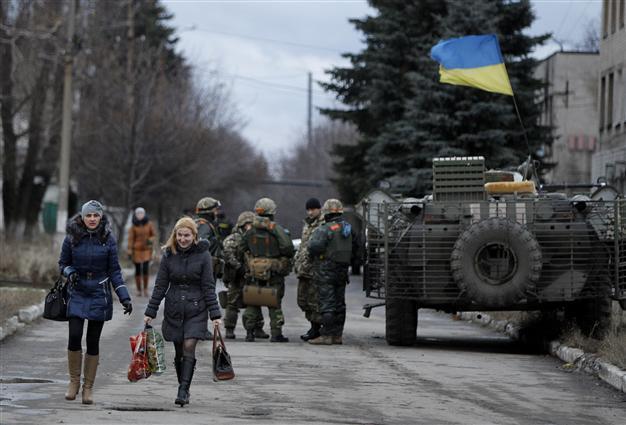Ukraine truce hangs in balance after 'difficult' talks
KYIV - Agence France-Presse

Women residents pass by a group of the Ukrainian government army soldiers in the village of Debaltseve, Donetsk region, eastern Ukraine Wednesday, Dec 24, 2014. AP Photo
The latest push for peace in Ukraine appeared moribund on Dec. 25 after initial talks failed to agree when the warring sides should meet again to try ending their eight-month conflict.Negotiations mediated by European and Russian envoys in the Belarussian capital Minsk broke up after more than five hours on Wednesday with the pro-Russian rebels reporting little to no progress.
That scuppered a plan for both sides to gather again on Friday in order to sign a comprehensive agreement reinforcing a September 5 truce deal that was followed by 1,300 more deaths.
The chief negotiator for eastern Ukraine's self-declared Donetsk People's Republic said he could not disclose the "difficult" talks' details because all sides preferred to keep their differences private.
But he stressed there was no guarantee that the contacts would resume any time soon.
"We had a difficult preliminary meeting," Denis Pushilin told a pro-rebel news website.
"The date and time of the next meeting is still up in the air. It is under discussion," Pushilin said.
The Belarussian foreign ministry added that "the date of the next meeting will be announced later".
Neither Ukrainian officials nor the Russian and European envoys spoke to reporters waiting outside the gated Belarussian state mansion that hosted the negotiations.
Sharply contrasting visions of Ukraine's place in Europe and its system of government have been persistently blocking a solution to the protracted war.
The two Russian-border provinces of Lugansk and Donetsk rose up against the historic shift toward Europe that Kyiv made in the wake of February's ouster of an unpopular Moscow-backed president.
The separatist commanders have since declared their own republics and will settle for no less than Ukraine becoming a loose federation in which they manage most of their own affairs.
This option is backed firmly by Russia but rejected by Ukrainian nationalists who make up an important part of President Petro Poroshenko's government.
Ukraine has remained tightly centralised since independence and is only now considering easing its hold over the country's regions in order to stem public resentment over the relative prosperity enjoyed in Kyiv.
Such problems undermined two deals reached in Minsk in September that Poroshenko was forced into after the rebels mounted a surprisingly effective counteroffensive. NATO believes the rebel campaign was backed by crack Russian forces and tanks, which were also seen by journalists on the ground.
Russian President Vladimir Putin denies the soldiers from his army who have crossed into Ukraine are there under orders, instead describing them as "volunteers" who are "answering the call of the heart".
The overall toll in the Ukraine conflict -- Europe's bloodiest since the Balkan wars of the 1990s -- is more than 4,700. The war has caused friction between many of the country's Ukrainian and Russian speakers that may take generations to heal.
The biggest immediate issue for the rebels is to make sure that Kyiv resumes social welfare payments it suspended last month out of fear that they were being used to fund the revolt.
Russia's Kyiv ambassador Mikhail Zurabov -- Moscow's envoy at the talks who defends the insurgents' stance -- said "economic" problems had been one of the four main points on the agenda.
But a Kyiv-based OSCE negotiator said the sides intended to steer clear of the payments issue.
The OSCE's Heidi Tagliavini added that details of a mutual troop withdrawal and a prisoner swap were to be debated.
Adding to the tensions was the Ukrainian parliament's decision this week to officially drop the neutrality the country adopted under Russian pressure in 2010.
The ceremonial shift in Kyiv's diplomatic allegiance was in line with Poroshenko's vow to put Ukraine under Western military protection in the face of Russian threats.
Ukraine sought NATO membership in the early post-Soviet era but was never viewed as a serious candidate.
The February change of regime in Kyiv upset Putin's plans to get Ukraine to join a new bloc that Moscow hopes will counterbalance NATO and the European Union.
Moscow had also set Kyiv's exclusion from all military unions as a condition for any Minsk deal.
Russia's defence ministry warned on Wednesday that Moscow would break off all contacts with NATO should Ukraine ever become part of the Cold War-era bloc.
















